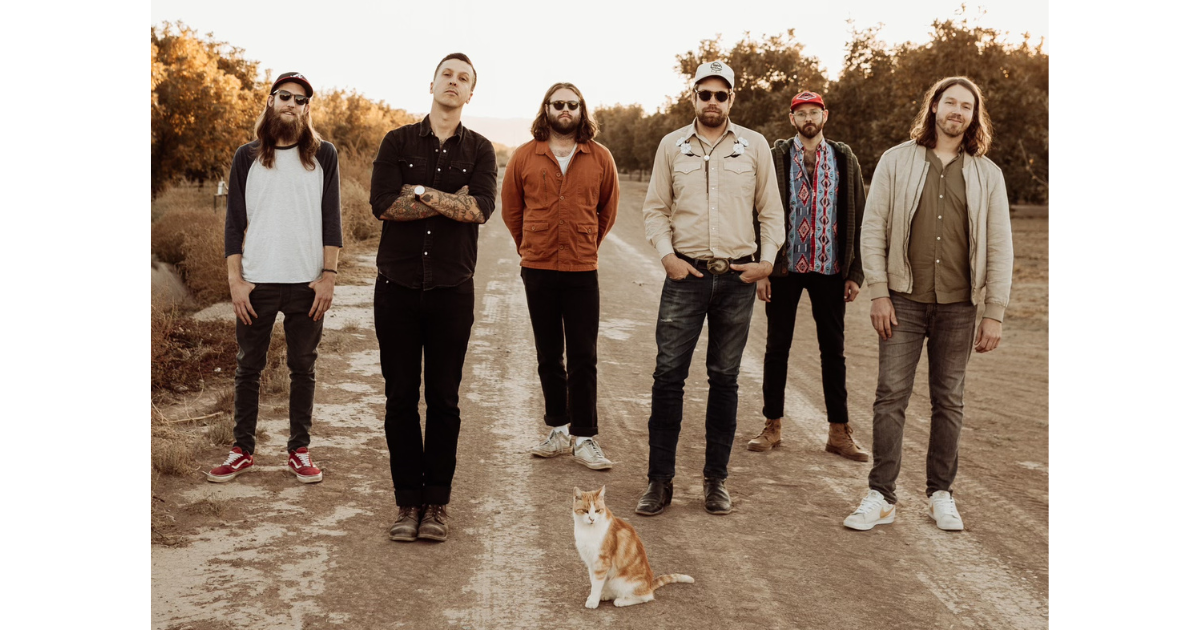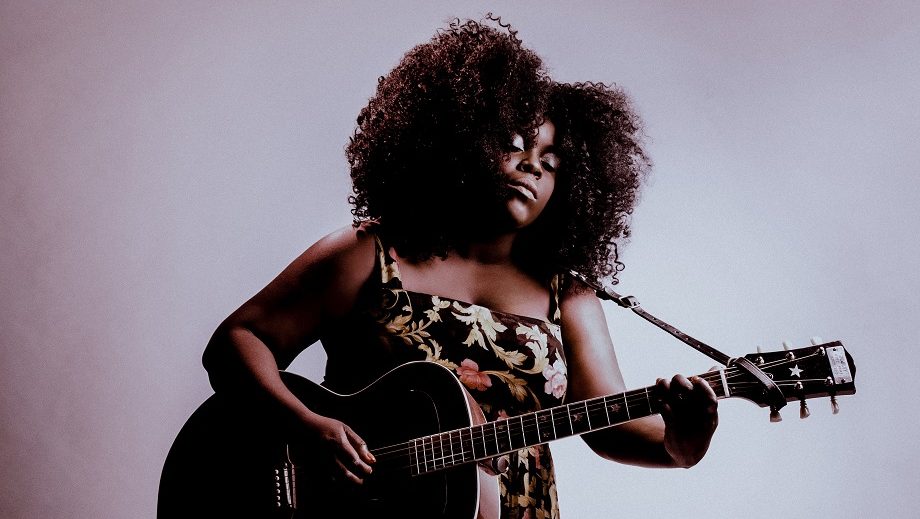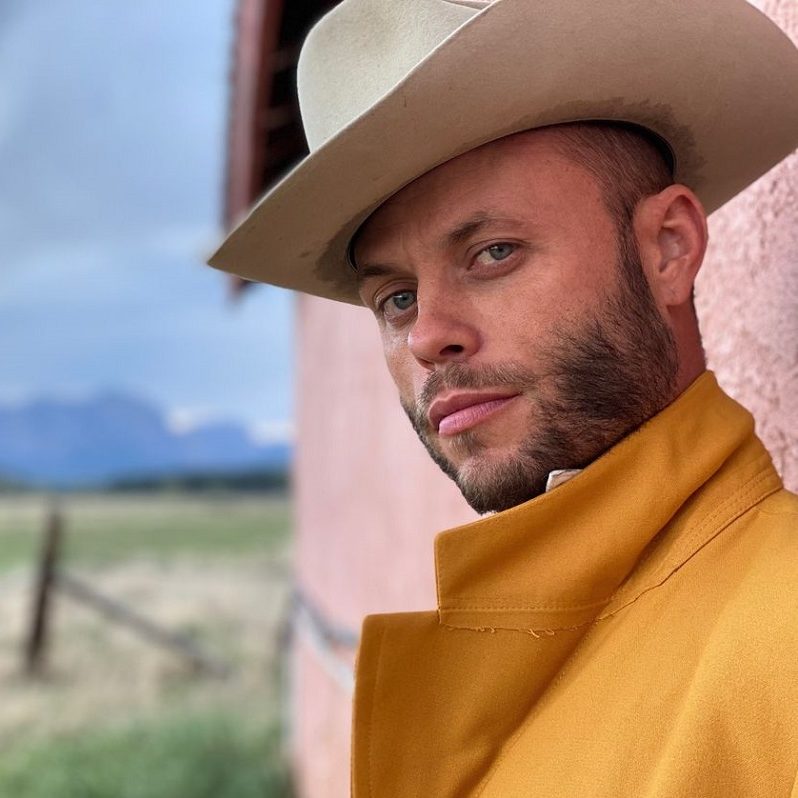The first two songs on American Aquarium’s new album Chicamacomico refer to the past year as one that nearly “broke us.” It’s a weariness that frontman BJ Barham came by honestly, writing songs in the wake of a string of losses — the death of his mother and grandmother, the suicide of a close friend, and a heartbreaking miscarriage that he and his wife suffered through before the birth of their daughter Pearl, now 4 years old.
Ably produced by Brad Cook (Bon Iver, Hiss Golden Messenger and Hurray for the Riff Raff), Chicamacomico is titled after the name of a life-saving station on the Outer Banks of Barham’s native North Carolina. It is the group’s 16th album in a 16-year career, a span of time that has seen American Aquarium move steadily up the Americana ladder. They’ve gone from hardscrabble bar-band origins to headlining Nashville’s fabled Ryman Auditorium, and even the Billboard charts. They cracked the Billboard 200 for the first time with 2020’s Lamentations, and bigger horizons beckon this year.
BGS: When American Aquarium was just starting out, could you even imagine a career like this?
Barham: When I first started, my goal was a bar tab. I was pretty awkward talking to girls, and having a band was a way to do that and also drink for free. I thought it might last through college. Well, it made me leave college, and I have not had to work a straight job since 2007. I always used to joke I’d never live a normal life where you go from point A to point B. But I ended up at B, I just took a weird way to get to family, home, kids and security, both financial and mental. There were a couple of pit stops deeper into the alphabet. As a kid, you don’t have the foresight to even think, “Twenty years from now, I want to have 15-plus records out.”
I never looked up at a clock until I started reading articles where they’d list us as influences. I remember coming up and listing Drive-By Truckers, Lucero and Whiskeytown as influences. And I appreciate being thought of in the same way now, but it kind of hurts to know I’m not the young guy on the scene anymore. I guess I’m the wise old guy now? Or old wise guy? But I’m very fortunate. With social media, you’re constantly comparing where you want to go and not looking down the ladder at where you’ve been, how far you’ve come. The last couple years taught me to appreciate the journey so far rather than the rungs still to climb.
Do you have any personal connection to Chicamacomico, the place you named the album after?
It’s where I wrote the record. Last few records, I’ll take a writing retreat with the wife and kid, go somewhere for a week and a half, rent a good-sized two-level house. I’ll go in the basement and write from 8 to 5, then come out for dinner and hanging out. For Lamentations, it was a cabin in the mountains in Waynesville in the fall. From the subject matter in my notebook of one-liners, I knew this record would be dark from processing some losses. So I picked a beach town off-season, Rodanthe, and it was desolate as a ghost town. That brought some things out you can hear on the record, because I couldn’t have written this there in July.
Every day, I’d take a break at lunch to go on a run, and there was this giant water tower that said Chicamacomico. I looked it up, and that’s what North Hatteras Island used to be called by the Algonquin tribe that settled it. It means ‘sinking sand.’ When the U.S. Postal Service came to town, Chicamacomico was hard to pronounce and spell. So they turned it into three separate cities: Rodanthe, Waves and Salvo. What better name for an album about loss than a place that lost its name to ‘progress’? The place has its own version of loss.
Everything came back to this idea of loss, and where I was. And it was desolate. I’d go on five- or six-mile runs every day, and I think I saw two cars the whole week. There were all these $4-5 million beachfront homes standing empty, real Walking Dead-type stuff. Maybe it was the quarantine, but we’d go on these beach walks and there were no footprints. My daughter loved having this entire town to herself. It was the perfect backdrop for this dark, personal record I was waking up every morning to write. Once I wrote that song, I knew it would be the title.
The title song “Chicamacomico” came from a miscarriage you guys experienced, right?
It happened about five-and-a-half years ago, before Pearl. It’s a heavy thing that takes a toll on both of you. There’s a lot of shame and blame, wondering if you were too stressed out. Did you do something wrong? Did previous actions set this in motion? Who knows? It’s a song for people who don’t know how to talk about it. I have the gift of being able to tell a story, which I’ve sharpened over 16 years. I have a strong ability to boil something down to a two-and-a-half-minute story I can present to people. I still couldn’t have written this one at age 25, or even five years ago. It would have been too new. But five-and-a-half years later, it feels real rather than just angry or sad. You have to give yourself time to rise above it and look down.
The honesty of it evokes emotions in people. That’s what drew me to music, getting down to the quick, as honest and raw and emotional as I can. John Prine was the master who could make you weep and laugh in two verses of the same song, and that’s the goal, to make you feel something. That song’s been six years in the making and it was a giant weight off my shoulders. First time I played it live, someone came up afterward to tell me their story and I still hear that from people. There’s no reason for blame or shame, 30-some percent of adults will experience it whether they know it or not. If I’ve learned anything in the way of sage advice, it’s that dragging stuff out of dark corners into the light takes away its power. I wanted to make sure I did it justice, not as a woe-is-me pity party. Let’s overcome this, talk about it, get past it.
This is a heavy, heavy record with a lot of loss. Tell us about “The First Year,” the song about your mother.
My mom died New Years Eve of 2019. My family jokes that she saw what was coming, so she checked out. But nobody wants to lose a parent. It’s heavy, and we had a strained relationship toward the end. The loss did not hit me at first, because the funeral was the easy part — friends and family telling great stories about her. That was comforting. The hard part came with the first birthday and anniversary and Thanksgiving and Christmas without her. On my birthday, my phone did not ring at 7:34 in the morning with her wishing me happy birthday. That’s when reality set in that she was really gone.
For my dad, it was their wedding anniversary. They’d married on the July 4 Bicentennial, and now his wife of 44 years was not there. My dad’s not an emotional person, but that day was extremely emotional for him. That song in particular was one of the heaviest, and it grounded this record. When we started sending out pre-orders, “The First Year” emerged as the song that was just wrecking people. As a songwriter, you want to evoke emotion and I feel like I hit the mark with that one.
I don’t think anybody has made it through the last two years without losing someone, whether to suicide or overdose or Covid or just getting old, just the myriad things plaguing us right now. That song can be hard for people, but I hope it serves as a salve. I’m not as old and wise as some, but the last 20 years, I’ve come to realize that this just never ends. I went to the funeral of an old high-school friend just last week, not even 40 years old. Luckily, I have songs as a conduit. I stay pretty chipper because I’m able to compartmentalize things, get them off my back, put them into the world and move on.
On the lighter side, there’s that line on “The Little Things” where you say you’re “just a father and a husband who knows his way around a microphone.” It sounds like you made good use of quarantine time.
That verse just wrote itself, one of those moments where I was trying to talk to my wife and in runs our daughter screaming about some dinosaur show she was watching. A lot of musicians looked at Covid as the industry stopping for two years, no shows or anything. But me not being able to play shows allowed me to be present as a great dad and fall in love with it so much. Now there’s no amount of money that can pull me away. I’ve turned down a lot to be there for the preschool play, swim lessons, picking her up from school. It’s like a new job.
Now I still love the other job, after 16 years. But being a dad is hands down the best. Now real life bleeds in when I write. I started out trying to write songs I thought might make people like me. A lot of posturing: “This is what rock and roll is, I’ll write about living that life of the hard-partying rocker on the road. It’s what they want to hear.” Then sobriety came in my 30s and I was not the rock and roll guy so much. It was more about real life. Then the kid comes and it changes to bigger social pictures, which is where the last three records have landed. It’s no coincidence that that happened after fatherhood. It’s not a magic switch so much as seeing the impact you have on another human and having a platform to say bigger things.
Your voice is certainly out-front on this one more than ever before.
I’ve become more comfortable with being intimate. Brad’s been a lot of help there, encouraging me not to scream so much. Live, I’m emoting over a powerful six-piece band cranked to 10. Here I’m out front with the band sitting behind it. Feels like being in a small room telling you a story no one else can hear, kind of controlled and hushed. Confessing, which can be just as powerful as a booming guitar solo. After we were done, I thanked the band for doing exactly what they needed to do. Not a lot of bands are confident enough to do ‘less is more.’ At the root of it, we’re a big rock and roll band, but they were great about showing restraint.
You see this a lot in Americana, rockers who are songwriters becoming more comfortable with being vulnerable and intimate as they get older. All my favorite songwriters start doing more of this over time, where it sounds more like a conversation between friends rather than a transaction at the local enormodome. Maybe I’m at that point. I’ve attempted records like this before, but there’s always been some bombast. This one hit the nail on the head of intimacy for me. It checks a lot of boxes: honesty, intimacy, confession. Simple but powerful. It didn’t leave me wishing for more guitar solos, it left me fulfilled.


